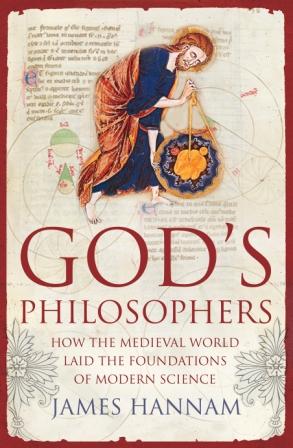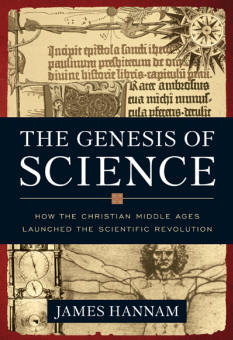
|
If you have enjoyed Bede's Library, you can order my book, The Genesis of Science: How the Christian Middle Ages Launched the Scientific Revolution (US) from Amazon.com or God's Philosophers: How the Medieval World Laid the Foundations of Modern Science (UK) from Amazon.co.uk. |
|
For my latest thoughts on science, politics, religion and history, read Quodlibeta
|
![]()
![]()
![]()
![]()
Links to history sites
![]()
Introduction
There are two kinds of links here - those that lead to useful resources for church history and essays about the history of science that I think are particularly worthy of attention. My subjective comments are set out below.
The Internet History Sourcebooks Project
The Galilean Library
The Works of Galileo
The Christian Classics Ethereal Library
The Ecole Initiative
The Non-canonical Homepage
Catholic Encyclopaedia 1913
History of Science Essays
The belief rating is defined as follows:
A - Atheist or sceptical agnostic
B - Middle of the road
C - Catholic
D - Broad Christian
E - Evangelical Christian
Content is rated out of ten. This rating in no way reflects my agreement with the material offered - but rather the amount of original material presented, web site presentation and the quality of writing.
| The Internet History Sourcebooks Project | |
| Author: | Paul Halsall |
| Belief: | B |
| Content: | 9 |
This site is absolutely fantastic for finding and reading the original sources. The list of available works seems to go on forever. In the Medieval section, you will find primary accounts from most periods of medieval history as well as lots of Byzantine and Islamic stuff. The church fathers are also covered in depth. Also very interesting are hundreds of different Saints' lives including the Golden Legend. The Ancient History sourcebook contains nearly all Greek and Roman texts as well as significant amounts from other areas. The earliest Christian documents are also well represented. In addition to these there are various specialist sections on Science, Islam and others.
Back to contents
| The Galilean Library | |
| Author: | Paul Newall |
| Belief: | B |
| Content: | 9 |
This new site already has a first class design and the beginnings of excellent content. In particular, an extended essay on The Galileo Affair is well worth reading. Galileo is one of the most popular sticks with which to beat Catholicism and demonstrate the eternal conflict between science and religion. Of course, few people know much about what actually happened and this essay, by a man who does, is a useful antidote to the usual stories. Newall attacks the myths surrounding the affair on both sides - both those which present Galileo was a martyr of science and those who say he deserved what he got. He also provides fresh insight into the motivations of those involved.
The best thing here though are Newall's Introductions to Philosophy. These cover an enormous range of subjects and invariably put complex ideas into terms that almost anyone will be able to understand. Of course, Newall would be the first to admit that they are written from a particular point of view, but that point of view is usually rather more interesting than most introductions to the subject. The essay on the Historiography is of special interest to me and frankly rather disturbing. The Galilean Library also hosts discussion boards and promises to grow in the future.
Back to contents
| The Works of Galileo | |
| Author: | Kerry Magruder |
| Belief: | B |
| Content: | 8 |
For those who do not fancy reading a full scale academic treatment of Galileo, the University of Oklahoma provides an alternative. This site is an on-line exhibition on Galileo's life and works which includes plenty of illustrations. For bibliophiles, the best pictures will be of the early editions of Galileo's books. The exhibition makes its way through Galileo's life and provides plenty of context - for example, why one university physicist refused to even look through Galileo's telescope. There are also helpful links to further reading. Because anybody can produce a web site, one of the problems with the internet is the trouble identifying resources that qualify as 'expert'. Here, at least is an expert view of Galileo.
Back to contents
| Christian Classics Ethereal Library | |
| Author: | Calvin College |
| Belief: | D |
| Content: | 10 |
This site provides hundreds of devotional works from the last two thousand years. It features the famous (from St Augustine to GK Chesterton) and the more obscure. If you are looking for a reference or want to have a look at some classic but not easily available works then this is the place to go. Also here are thirty eight volumes of early Church Fathers which is a very useful resource for church history.
Back to contents
| The Ecole Initiative | |
| Author: | Anthony F Beavers et al |
| Belief: | B |
| Content: | 8 |
A wide ranging resource on the history of the Christian Church where you will find a chronology, many short articles on a wide range of subjects and a small number of more detailed essays. For general queries on church history this is probably the best jumping off point on the web.
Back to contents
| The Non-canonical Homepage | |
| Author: | Wesley Center |
| Belief: | D |
| Content: | 8 |
This is the most complete collection of Pseudepigrapha, New Testament Apocrypha, Gnostic texts and other ancient religious material I've found. The Internet has made it much easier to access non-canonical works and this can only be a good thing. If you would like to find out more about these texts then check out The Seekers Guide to the Bible, chapter 5.
Back to contents
| The Catholic Encyclopaedia 1913 | |
| Author: | New Advent |
| Belief: | C |
| Content: | 10 |
As an academic resource on the history of the church nothing beats the Catholic Encyclopaedia. The more I use it the more I love its combination of intellectual firepower, first class bibliographies and wide range. On medieval science it is far better than even the Dictionary of Scientific Biography while on the bible and Christian thought it is equally unmatched. Yes, it is Catholic, but no Christian or non-believer should refrain from consulting it.
This is the 1913 edition (you can find the latest in a good library) and despite being the best part of a century out of date, it remains an excellent resource. For modern Catholic doctrine, of course, it's pretty much useless as Vatican II was fifty years away, although that has never stopped anti-Catholics from quoting from it to show how backward we still are.
Back to contents
| History of science essays | |
| Author: | various |
| Belief: | D |
| Content: | Na |
Christianity and the Birth of Science: This is an excellent essay by geneticist, Michael Bumbulis, about the role that Christianity played in the genesis of modern science. I enjoyed reading it because his ideas were so similar to mine, although he has better researched and expressed them. The essay owes something to Stanley Jaki, as Bumbulis acknowledges but contains much that is original. In all an excellent piece of work and the best introductory piece on the web.
Christianity: A Cause of Modern Science?: Eric Snow explains the Jaki and Merton theses in this helpful essay. Jaki puts the birth of science down to Catholic scholastic philosophy whereas Thomas Merton thought it had more to do with the Protestant ethos.
Back to contents
![]()

